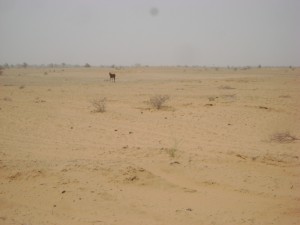The Nigerian Conservation Foundation (NCF) has commended the Federal Government of Nigeria for releasing N10 billion for the commencement of the implementation of the Great Green Wall (GGW) project.
 Minister of Environment, Hajiya Hadiza Mailafia, disclosed recently at the National Conference on Environment in Makurdi, Benue State, that the Federal Government had made a commitment of N10 billion towards the implementation of the United Nations-backed programme.
Minister of Environment, Hajiya Hadiza Mailafia, disclosed recently at the National Conference on Environment in Makurdi, Benue State, that the Federal Government had made a commitment of N10 billion towards the implementation of the United Nations-backed programme.
The Great Green Wall brings together 11 countries to plant trees across Africa to literally hold back the advancing Sahara Desert with a swathe of greenery, lessen the effects of desertification and improve the lives and livelihoods of communities.
In Nigeria, the project aims to address desertification, enhance natural resource management and promote ecosystem integrity in the dryland in the Northern parts of the Country. The Nigerian project stretches from Zamfara and Kebbi states in the North West corner along the northern border of Nigeria to the extreme eastern border in Borno State. Eight states are involved in the project.
While commending the government for the effort made and its commitment towards the initiative, the NCF calls for the following strategic steps to be employed before and during the implementation to achieve maximum results:
- A National Institutional Framework for Project Implementation should be very definitive and focused. The NCF suggests that the framework takes into consideration the expected benefits and elements that the project should capture.
- This multi-purpose project needs strategic approach to implementation. The NCF demands effective follow-up and action based on the principles and actions highlighted in the Strategic Plan.
- The project should be seen as an opportunity to boost natural resource productivity and reduce stress and tension in natural resource use among major stakeholders. However, a conflict mitigation and management strategy should be put in place by participating states so as to guide against actions that can punctuate or slow down the process of implementation in the participating states. The project should be seen as a solution rather than a problem for communities, states and people of the benefiting areas.
- Science and adaptive field research should be inculcated into the implementation plan of the project. This should be fashioned out in collaboration with key universities and research institutions in the project implementation areas.
- The project demands a multi-faceted approach to capture essential benefits and involve all major and other necessary stakeholders. Community involvement in project planning and participation is crucial. Major resource user groups should be seen as actors and not only receivers of process in the project planning and implementation.
The GGW, an initiative spearheaded by African heads of states, will stretch about 7,000km from Senegal in the west to Djibouti in the east and will be about 15km wide as it traverses the continent, passing through Mauritania, Mali, Burkina Faso, Niger, Nigeria, Chad, Sudan, Ethiopia and Eritrea.
The programme aims to support the efforts of local communities in the sustainable management and use of forests – a key theme of the 10th session of the UN Forum on Forests (UNFF10), currently taking place in Istanbul – as well as other natural resources in drylands.
Among other things, the planting of trees is expected to provide a barrier against desert winds and will help to hold moisture in the air and soil, allowing agriculture to flourish. It is also expected that the GGW will reduce erosion, enhance biodiversity and improve countries’ resilience to climate change.
“NCF, being the foremost and oldest environmental protection NGO in the country, has witnessed similar government/donor projects in the past which, unfortunately, through neglect and improper implementation, often excluding community participation/ownership, became dismal failures, allowing the sands of the desert to ravage thousands of square kilometers of former pasture lands, turning them into uninhabitable desert and hundreds of thousands of pastoralists into environmental refugees, thus greatly exacerbating the grave insecurity scenarios in this region that we are faced with today. We would like to believe that such neglect and indolence in implementation would not be allowed to befall this extremely laudable GGW project and that together with our other neighboring states; we would be able to find a permanent solution to the ravaging environmental disaster of desertification,” stated Alade Adeleke, Acting Executive Director of the NCF.
